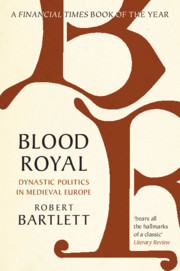3 results
7 - Family Life and Conversion in Gaul, Hispania, and Italy
-
- Book:
- Conversion and the Contest of Creeds in Early Medieval Christianity
- Published online:
- 06 June 2024
- Print publication:
- 13 June 2024, pp 188-213
-
- Chapter
- Export citation

Blood Royal
- Dynastic Politics in Medieval Europe
-
- Published online:
- 09 July 2020
- Print publication:
- 09 July 2020
22 - Rebellion and Violence in Vietnam
- from Part V - Popular Protest and Resistance
-
-
- Book:
- The Cambridge World History of Violence
- Published online:
- 13 March 2020
- Print publication:
- 26 March 2020, pp 429-448
-
- Chapter
- Export citation

